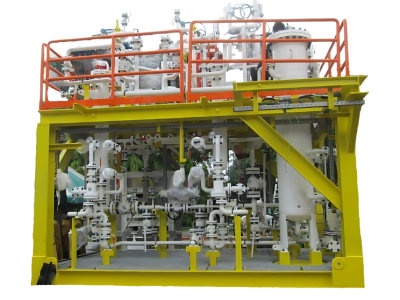FUEL GAS CONDITIONING
At ISS, we specialise in optimising fuel gas systems through our expertise in fuel gas conditioning. This process is vital for ensuring that the gas used in turbines, engines, and other equipment is clean, dry, and free from contaminants. Our advanced conditioning solutions include filtration, heating, and pressure regulation, tailored to meet the specific requirements of your operations. By effectively removing impurities such as liquids, solids, and sulphur compounds, we ensure that your fuel gas meets the highest quality standards, leading to improved efficiency, reduced maintenance costs, and extended equipment life. With our precise and reliable fuel gas conditioning systems, your operations remain smooth, safe, and economically viable.

Technical Specifications
Performance Metrics
Gas Purity Levels: Delivers ultra-clean fuel gas with impurities reduced to less than 1 ppm, ensuring optimal turbine and engine performance.
Flow Rates: Supports a broad range of gas flow rates, from 0.5 to 100 MMSCFD, tailored to meet diverse operational requirements.
Pressure Regulation: Maintains precise pressure levels from 500 to 1500 psi, ensuring stable fuel delivery and efficient combustion.
Temperature Control: Achieves consistent fuel gas temperature conditioning, down to ±1°C, enhancing combustion efficiency and reducing emissions.
Materials Used
Filtration Systems: Equipped with high-efficiency coalescing filters made from stainless steel and advanced polymeric materials for effective particulate and liquid removal.
Heat Exchangers: Utilises compact, corrosion-resistant heat exchangers for efficient gas heating or cooling, ensuring reliable operation.
Pressure Regulators: Constructed from durable, corrosion-resistant alloys to maintain precise control and stability under varying conditions.
Piping and Valves: Made from high-grade stainless steel, ensuring durability and long-term resistance to corrosion in harsh operating environments.
Applicable Environments
Offshore Platforms: Designed to function reliably on offshore installations, where consistent fuel gas quality is crucial for uninterrupted power generation.
Onshore Processing Facilities: Ideal for onshore plants, ensuring that fuel gas meets the stringent quality requirements for turbines and other equipment.
Remote Power Generation Sites: Suited for remote locations, providing dependable fuel gas conditioning with minimal maintenance requirements.
High-Temperature and High-Pressure Operations: Engineered to perform under extreme conditions, maintaining fuel gas integrity even in challenging environments.